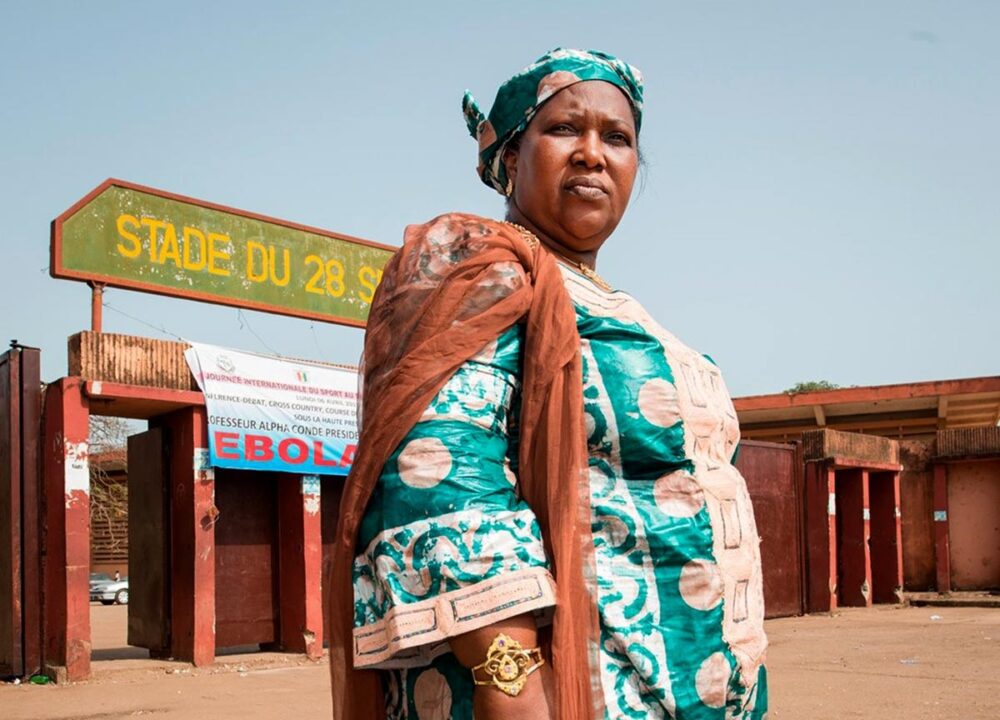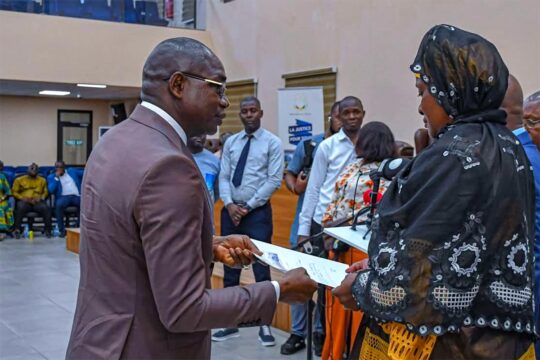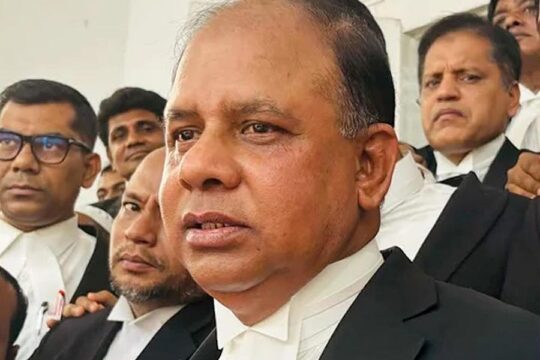July 31 marked one year since the Dixinn Court of First Instance in Conakry, Guinea, handed down a historic verdict in the September 28, 2009 massacre trial. Eight of the twelve defendants were sentenced to jail terms ranging from ten years to life. Four were acquitted. The eight convicted defendants were also ordered to pay 12 million euros in compensation to the 334 civil parties. As soon as the decision was handed down, most of the parties to the trial appealed. But since then, proceedings have not moved forward.
The Court of Appeal had three months to organize a new trial after all parties had filed their appeals. This deadline has now long passed. But victims still believe that an appeal trial will take place and are waiting hopefully for it to happen. Human rights activist Mamadou Kaly Diallo, who became a civil party in this case for acts of torture, continues to believe in it. He is counting on the Guinean authorities’ commitment to organize this trial.
“It’s true that the verdict was welcomed, but we are eagerly awaiting the outcome of the appeal,” says Diallo. “All parties have lodged appeals: the defence because they believe the charges should not be reclassified as crimes against humanity; the civil parties because several victims were left out; and the prosecution because it believes not all those responsible for the crimes have been convicted, even though the court upheld the principle of command responsibility.”
Hope for the forgotten victims
Asmaou Diallo, who heads the Association of 28 September 2009 Victims, Friends and Relations (Avipa), is hoping that victims like herself who were left out by the trial chamber will be compensated. Avipa may well be the biggest association of massacre victims, but a number of its members were omitted from the first instance trial.
Most of these forgotten victims blame Avipa and its president. They accuse her of favouritism, of communicating the names of some and not others, without knowing that Diallo herself has been omitted from the compensation programme currently being administered by the country’s authorities.
“At Avipa, there are 737 victims. So not all of these people have been taken into account, because the ruling only mentions 334 people,” Diallo explains. “There are also other associations working with other victims who are not included in the group to be compensated.”
Pessimists, boycotters and those who are silent
Unlike the victims, who remain hopeful, lawyers for the civil parties are pessimistic. Alpha Amadou DS Bah, head of the lawyers’ collective that represented Avipa victims before the trial court, no longer believes at all in the process. He thinks the other convicted persons could be pardoned in the same way that Captain Moussa Dadis Camara, head of the military junta at the time of the massacre, was pardoned on March 28, 2025 by presidential decree. “Now that the main person convicted in this case has been pardoned, I think the case has been emptied of all substance and there is no point in continuing with the appeal proceedings,” says Bah, who is coordinator of lawyers for the civil parties. “We are certain that for the other convicted persons, it is only a matter of time. The appeal trial no longer makes sense.”
Because of Camara’s pardon, some reject outright any future appeals trial. They refuse to participate even it takes place, at least as long as Camara remains free. This is the position of the defence for Commander Aboubacar Sidiki Diakité, alias Toumba, whom the trial court sentenced to ten years in jail. “When there is an appeal, it suspends implementation of the decision taken by the first judge. Since the decision is not final, the President [of the Republic] should have waited to exercise the right of pardon,” says Lanciné Sylla. “The consequence of exercising [this] right without the conditions being met is to prevent the appeal trial from taking place. This is obvious, because Captain Dadis, who has been released, will no longer participate in this trial. So the presidential decree spells the end of the appeal trial. In any case, I will not take part in condoning injustice. I have already told my client this.”
Other parties to the trial such as civil parties’ lawyers led by Hamidou Barry, who defended victims not affiliated with AVIPA, did not respond to our requests for comment. The same goes for the authorities, even though they reassured the Deputy Prosecutor of the International Criminal Court (ICC) last May of their willingness to organize the appeal trial. “As I leave Guinea, I am reassured to know that the trial will continue at the appeal stage, that it will be brought to a conclusion and that reparations for the victims will continue,” ICC Deputy Prosecutor Mame Mandiaye Niang said at the end of his visit to Conakry on 19, 20 and 21 May 2025. “There has been no change of course. The government has demonstrated its willingness to provide the necessary support to the judiciary in its quest for justice.”
First instance trial of five other defendants
Another challenge facing the Guinean justice system is the related trial of five defendants who did not appear at the first trial. This case involves Jean-Louis Kpoghomou, Georges Olémou, Thomas Touaro, Jacques Sagno and Bienvenue Lamah. According to Aboubacar Sidiki Diakité, alias Toumba, these military officers and gendarmes were very close to Captain Moussa Dadis Camara in 2009 and allegedly played a role in the September 28 massacre.
All were arrested and detained in November 2022 and referred to the Dixinn Criminal Court for trial. Their lawyers, who argue their innocence, appealed the referral order. The Conakry Appeals Court examined these appeals and dismissed the case in favour of the defendants, with the exception of Colonel Bienvenue Lamah. Dissatisfied with this ruling, the public prosecutor’s office immediately appealed to the Supreme Court.
In a July 28 ruling, the Supreme Court rejected the prosecution’s appeal. Defence lawyers say they are currently fighting to secure the release of their clients following that ruling by the country’s highest court. If they succeed, Lamah will be the only one in the dock standing trial at the Dixinn Criminal Court. In his case, all avenues of appeal against the referral order have been exhausted. His lawyer, Zézé Kalivogui, is eagerly awaiting his client’s trial.
“The preliminary article of the Criminal Procedure Code states that the defendant must be tried within a reasonable time frame. Based on this principle, under normal circumstances, once a case has been referred to court, the defendant must be tried. However, when the court takes more than five months to hear the case, we are no longer within a reasonable time frame,” he says. “That is why we are continuing to push for the trial. We are constantly following up with the public prosecutor’s office that organizes it. I believe that the composition of the court has already been decided. We are expecting that the judgment could be in October.”
Lamah was arrested on November 21, 2022 and held in Conakry central prison. At the time of his arrest, he was commander of the Conakry regional gendarmerie.







